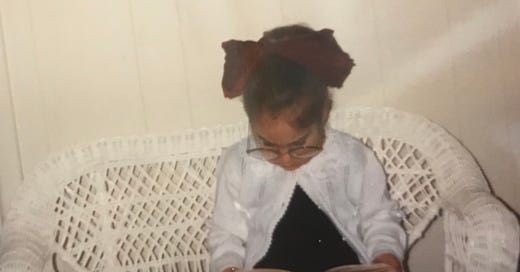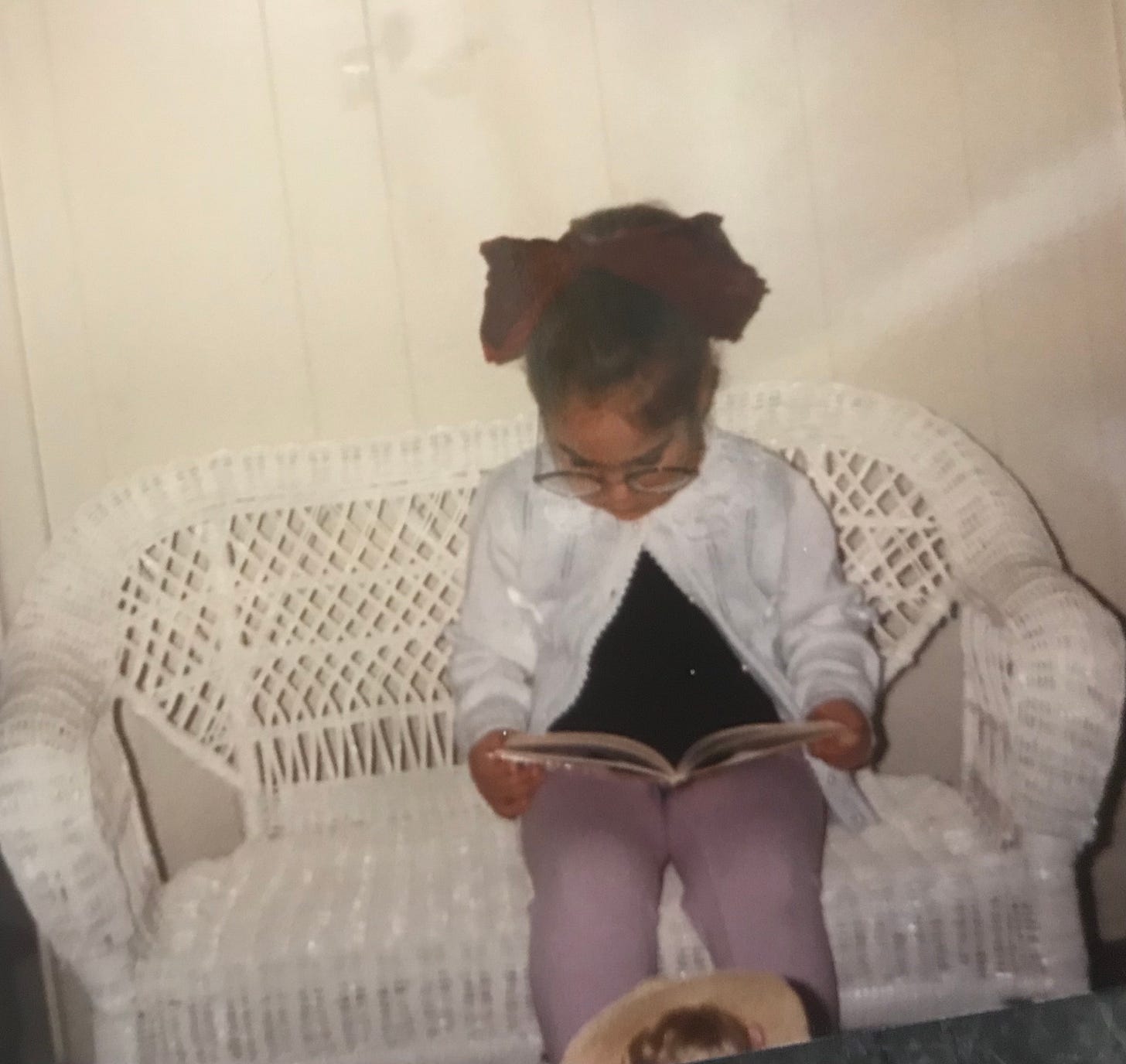Wisdom Two: Go Your Own Way
An ode to doing things outside of any systems; particularly, reading and writing about literature.
This is the second essay in a series called Five Wisdoms, which I launched for the new year. I created this series in hopes of expressing gratitude, in praise, for writing that provided me a sort of intellectual wisdom. But it took me some time—longer than expected!—to deduce those wisdoms. This one is most literal—it’s my praise for the process of learning, and thus gleaning wisdom, through reading. Read the introduction to the series and the first wisdom, “Fame Will Only Take You Down,” here.
When I was around 25, I began reading the classics. What happened, really, was that I was perusing a local bookstore and glimpsed a familiar title, Jane Eyre. And though I knew the story in summary, I never actually read the book in full and thus wondered, what lie beneath the lore? So it began with Jane Eyre but took wing with Anna Karenina, a novel I am most beholden to. Completely taken in by story, it was Tolstoy’s style that stirred—the aesthetic language of a character’s interiority, the heavy descriptions of external aesthetics, like scenery and clothing:
He stepped down, trying not to look long at her, as if she were the sun, yet he saw her, like the sun, even without looking.
And within it, so much life, fraught with tension and impulse and obligation:
Anna Arkadyevna read and understood, but it was unpleasant for her to read, that is, to follow the reflection of other people’s lives. She wanted too much to live herself. When she read about the heroine of the novel taking care of a sick man, she wanted to walk with inaudible steps round the sick man’s room; when she read about a Member of Parliament making a speech, she wanted to make that speech; when she read about how Lady Mary rode to hounds, teasing her sister-in-law and surprising everyone with her courage, she wanted to do it herself. But there was nothing to do, and so, fingering the smooth knife with her small hands, she forced herself to read.
It’s near criminal we often encounter these works only while young, when our brain is too ripe to comprehend beauty or depth. While reading something like Jane Eyre in high school might act as a seed for future wisdom (I can only imagine—since in high school I mostly consulted SparkNotes), reading might be most transformative to the older, more developed mind.
So I read and reread, am still reading: Shakespeare, Hemingway, Fitzgerald, Baldwin, Bronte(s), Achebe, Morrison, Dostoevsky, to name a few. I soon veered from “canon” and allayed my own inclinations: Arundhati Roy, Jim Harrison, Ghada Samman, Joy Williams. This initial process unfolded slowly, over a period of five years or so, and was akin to an industrial overhead light being flicked on and illuminating everything. I can only explain it by synapses: everything—in literature, yes, but also in culture, history, and even the minutiae of daily life—everything in the entire world felt suddenly connected by web. Of course, I didn’t learn everything, have yet to read even close to everything (I’m constantly reminded of my literary deficiencies by Substack). But I amassed a spiritual context through reading, particularly as an adult, and its effects were more holistic than imagined. This awakening is paradoxically difficult to describe with language. It’s not that I enjoy everything I read; but (re)reading elemental texts built—builds—a global understanding outside of literature itself, an intellectual lexicon, a context that gives life a certain coherence.
What I’m attempting to explain is a process of mind bloomed later in life—or, a late bloom. And with it, an incredible sensation of knowledge, an awareness of one’s mind imbuing with it, which may only occur in adulthood. It’s not that we can’t have epiphanies while young, but more that we don’t yet pay attention to the process of becoming. It’s as if youth’s relativity to knowledge (and within youth, I include university-aged) is too adjacent—most growth occurring without effort, the mind too deep in the thickets of biological change, not enough time lapsed for reflection.
Many adults read; not many adults study. The process I am referring to, which I will call literary self-study, works outside of any homogenized system. It is not leisurely reading, though it is not laborious, either. It is reading that involves a certain amount of presence, motivated not by authority nor any ending result, but by autonomous curiosity. One must pay attention. And I can attest, this kind of presence is a muscle that strengthens and flexes over time.
Though there will be evident shortcomings in one’s self-written, amateur syllabus, I believe self-study is a viable, and respectable, path for learning literature. And perhaps, even for becoming a writer, too. This isn’t a diatribe against MFAs! I respect the value of a hard-earned degree, and sometimes regret the choice of my own. I too often feel my letters insignificant, as I never properly studied creative writing or literature, even while pursuing a degree in art history. (Barring one poetry lit class; and my memory retained only one poem, by Plath.) Instead, I grew in inquisitive initiative with age, and found benefits to this path: a learning free of any overarching academic flattening, a knowledge all one’s own, a mind’s infinite potential with ‘til-death-do-you-part capacity. In other words, being a late bloomer can be an exalted experience, because it is independent of any standardized system. It can be yours alone, shaped by your personal life experience, and persistent, too, despite a myriad of uncontrollable life conditions and predicaments one might fall into.
Of course, there are challenges. This process requires the privilege of time; though, given the amount of scrolled minutes a modern mind wastes, I believe time can usually be found, even if in short increments. And there is an issue of bias, too, that a reader (or writer) must become cognizant of. For example, I tend to gravitate toward the poetic and philosophical, writing that harbors an emotional core. I must consciously challenge and expand my own affections by keeping up with contemporary discourse and criticism, and writing down any literary mentions I come across. (I consciously forced myself to read contemporary autofiction, and in some cases, even enjoyed it.) In order for self-study to be widening and not compressive, one must remain open to texts that don’t necessarily spark interest. Prejudice can leave some (or all) of a work’s potential untapped.
External opinion via criticism is as imperative to the self-learned quest as one’s own autonomy. I try to choose books of diverse idea and style, novels past and present, historical and contemporary. There is a breadth of available contemporary discourse that succeeded in prodding my own point of view, by way of instigation (as good criticism does). But criticism can also prove exhausting and tedious. Discourse is a rather cynical realm to travel in consistently, and can rust through any aforementioned pleasures of reading. A student, then, must strike balance between the joyful intimacy of text mingled with mind alone, and the expansiveness of opposite perspective and preference.
My writing often seeks to illustrate this process of late blooming, because it is still happening to me. I learned to write poetry, for example, solely by self-study, meaning I walked into McNally Jackson on Prince Street in New York and asked someone working at the help desk if they had recommendations. I can’t recall the specifics of his face though I do remember his hands passing me book after book: Wislawa Szymborska, Albert Goldbarth, Osip Mandelstam, Gwendolyn Brooks, Pablo Neruda. The most prestigious Intro to Poetry course couldn’t provide me better foundation. Seven years later and heavily influenced by the poets above, I published my own collection of poems.
I should mention that, if one is reading mainly to glean the craft of writing outside of an organized system, I found it helpful to add bits of formal structure, like independent classes or workshops, later. External structure proved most effective after I had time to develop my voice, a singular and personal point of view, independently. Only then did I find myself most open to another’s assistance in honing, breaking, or challenging my writing.
It doesn’t bother me that I will likely remain a few (if not more) steps behind other writers that do hold MFAs. Their foundation and repertoire will inherently contain references I won’t know. That is the crux of this path, that there is no end-game, no eventual degree or accolade. There will always be more to read, more to learn, more to study, more to realize. The late bloomer approaches this fact as a gift, and with her particular ability to look inside from without. Sans any preconceived notion or overt guidance, a more naturally heterogenous perspective takes root, and the late bloomer might actually be capable of illuminating something unexpected, by way of her novel lens.
I will remain in this process of self-study of literature and writing by reading in perpetuity. And there will surely be ebbs and flows, eras of more time, eras with less. I will never “arrive,” a most comforting fact, that the mind might be prodded wider and wider until death. And there is something of ownership, too, when relying on the self, that no matter the amount of money or status, such knowledge is available and dependent on one’s initiative alone.
In coming to know literature by way of these two disparate avenues—one being a formal, traditional education; the other, an independent, self-propelled one—there won’t be one supreme choice, only an amalgamation of circumstance, will, and interest. Most days, I wish I had an MFA. But that opportunity passed, so I gladly follow this path instead, one of my own making, rife with fulfillment and pleasure.
Perhaps, a bridging of the two would be supreme? I will end with a quote by Jim Harrison, which I discovered in an introduction of Pablo Neruda’s Residence on Earth.
Once in reaction to the anemic MFA programs I’ve come in contact with, and while being banally prescriptive in the manner of northern Midwesterners, I conceived of a program where poets would work for a year in the country, then a year in the city, all the while keeping journals and studying the perhaps three hundred central texts of world poetry, and after that, a third year at the university. Our bifurcated and predatory culture crushes and strains the economically non-viable language of earth from our lives.





